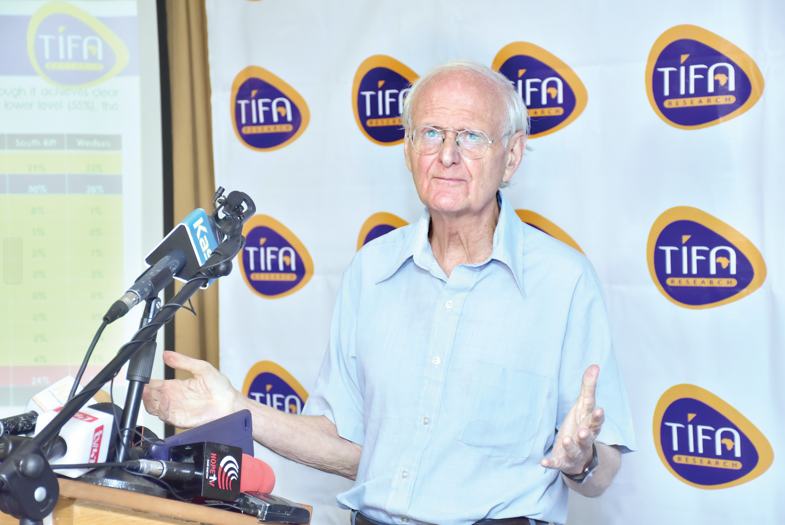Most Kenyans are concerned about high cost of living – Tifa

High cost of living, hunger and unemployment are the main problems now facing Kenyans in their localities, a new report has shown.
According to a Tifa research opinion poll released yesterday, 48 per cent of Kenyans said the high cost of living is the main problem they are facing while 25 per cent and 13 per cent cited hunger and unemployment, respectively.
Releasing the research findings of the poll yesterday, Research Analyst Tom Wolf said a slightly higher Kenya Kwanza supporters at 48 per cent cited high cost of living as the main problem compared to 47 per cent of Azimio la Umoja’s supporters.
“For the country as a whole and across the current political divide, there are hardly any contrasts in terms of what are identified as the main problems people are facing in their local areas, with the high cost of living, hunger/drought and unemployment being by far the most frequently mentioned,” said Wolf.
Most mentions
He said the cost of living was reported as most challenging in South Rift at 62 per cent, Western at 61 per cent and Coast at 51 per cent, while hunger and drought was highest in Northern Kenya at 52 per cent and Lower Eastern at 40 per cent.
While joblessness receives most mentions in Central Rift at 21 per cent, Lower Eastern at 20 per cent and Nairobi at 18 per cent, its levels are significantly lower than the other two major issues mentioned.
Although nearly one in five Kenyans or 17 per cent reported that they and other household members “always” or “often” sleep hungry, more Azimio than Kenya Kwanza supporters indicated that this condition is affecting them, with 20 per cent and 14 per cent, respectively.
Similarly, 56 per cent of Kenya Kwanza supporters said they have never slept hungry compared to 44 per cent from Azimio side. Some 26 per cent of Kenya Kwanza supporters said they slept hungry only once in a while as compared to 33 per cent in Azimio.
The poll was a household-based survey, conducted between March 11-19, with just over 2,065 randomly selected respondents.
“It has become increasingly clear to most Kenyans that making quick and tangible improvements to the dire economic situation inherited from the previous regime has not been as forthcoming as many had thought, or at least hoped. That is, making campaign promises is one thing, but actually delivering on them is another,” said Wolf.
Public debt
Wolf said an additional challenging factor has been drought, the impact of which continues, even with the rains.
Additionally, he stated that servicing massive public debt, inherited by the current government, continues to swallow a huge proportion of both local revenue and new lending.
On the Kenya Kwanza performance, the poll showed that the main achievement cited by the respondents is launch of the hustler fund at 29 per cent.
By parties, 37 per cent of Kenya Kwanza supporters cited the launch as an early success for President William Ruto’s Government compared to 22 per cent of Azimio.
Subsidising the cost of fertiliser was the second area of some success for the Government, polling five percent on the overall and nine per cent and two per cent for Kenya Kwanza and Azimio supporters respectively.
So far, Wolf said the main failure cited by Kenyans was increased economic hardship at 37 per cent and by parties, it polled at 35 per cent and 41 per cent of the Kenya Kwanza and Azimio supporters respectively.
One in five Kenya Kwanza supporters (21 per cent) fail to attach any failure to it, as compared with less than one-third that figure (six per cent) among Azimio supporters who also failed to blame it for anything.
Other issues cited included failure to keep campaign promises at 14 per cent, with more Azimio supporters at 21 per cent than Kenya Kwanza at 10 per cent saying this.
Increased corruption and dropping of major corruption cases, increased debt and education are also other issues raised.
The respondents urged the Government to prioritise reducing the cost of living, creating jobs and improving the education system.
“Given the above realities, it has become clear that the success of Kenya Kwanza largely issue based pre-election campaign has become a major challenge to its continued popularity, given the difficulties it) now faces in making such campaign promises a reality, at least in the short term,” Wolf stated.










